Sixteen Classics

[This fragment is available in an audio version.]
I just finished writing about the process of, and lessons from, processing 900 inherited LPs into my collection. I thought it wouldn’t be fair to stay meta, so here is a handful of my favorites from among the new arrivals. Yes, they are all music by dead white men, performed by other dead white men (and a couple of women). Sorry. They were released between 1953 and 1978.
You can buy these online at discogs.com but I don’t recommend it because Discogs is sleazy, or on eBay, but I don’t recommend that either. Because why not go to an actual record store (most towns have ’em) and cruise the Classical section? (It’s usually pretty quiet.) Pick up some Rock & Roll and Country and Dubstep and Reggaeton and Dixieland and Bollywood while you’re there too. My favorite thing to do in a record store is leaf through the “new arrivals”. Which, granted, wouldn’t include any of these.
Trumpet trills! ·
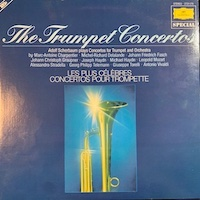 Trumpet Concertos, performed by
Adolf Scherbaum. Early stuff; the composers are Haydn, Leopold Mozart, Marc Antoine Charpentier, Alessandro
Stradella. Giuseppe Torelli, Vivaldi, Telemann, Johann Christoph Graupner, Johann Friedrich Fasch.
Trumpet Concertos, performed by
Adolf Scherbaum. Early stuff; the composers are Haydn, Leopold Mozart, Marc Antoine Charpentier, Alessandro
Stradella. Giuseppe Torelli, Vivaldi, Telemann, Johann Christoph Graupner, Johann Friedrich Fasch.
None of these works are musical monuments, but Scherbaum digs into the big baroque lilt and offers the juiciest trills and ornamentation I’ve ever heard anywhere; impossible not to smile. Sound quality is adequate.
Date: 1965.
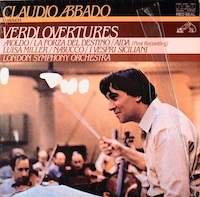
Opera, but no singing · Verdi Overtures, with Abbado and the London Symphony. I enjoy live opera but for no reason I can explain just don’t listen to recordings. Which is probably unfair to Verdi, because on the evidence here, he wrote really superior music. Abbado and the Londoners really bring it; this is the kind of record that, if you’re reading a book or something it regularly grabs your attention away. Terrific sound too.
Date: 1978.
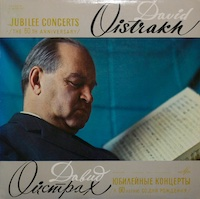
Oistrakh! · David Oistrakh’s 60th Birthday Jubilee Concert. Oistrakh plays the Violin Concerto with the Moscow State Philharmonic, and then conducts them in the 6th “Pathétique” symphony. Recorded live on two successive evenings in September 1968 by Melodiya, the old Soviet record label.
This is my favorite among the 900 LPs, and it’s not close. I can’t say which performance I like better. Oistrakh, to quote George Clinton, tears the muthafuckin roof off in the violin concerto, with fabulous tone and dynamics, and isn’t shy about using showy cheap tricks, which is fine by me. Also this is one of Peter Ilyich’s best works.
The Pathétique is more controlled, but it’s controlled ferocity; some of the sequences have an aesthetic that is straight out of heavy metal.
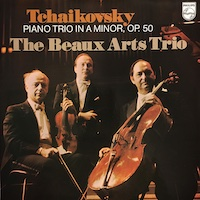
In case it’s not obvious, listening to this album is like being at a very fine rock concert by someone who’s on top of their game, knows it, and is determined to send the audience home with their heads reeling.
Date: 1968.
Beaux Artistes · I mean the Beaux Arts Trio, who performed for fifty years starting in 1955. Tchaikovsky Piano Trio in A Minor, Op. 50 is a really fine piece of chamber writing and the Artistes bring loads of dynamics, this explodes out of the speakers.
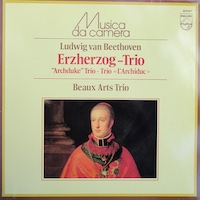
Beethoven “Archduke” trio, Op. 97. Another fine performance of essential music. There’s a problem with chamber music; it can be more fun to play than to listen to, in particular because a lot of recordings are dominated by steely mid-string surface noise. These two just speak truth, the wiggles in the LP grooves really capture what those fine instruments, well-played, sound like.
Date: 1971, 1975.
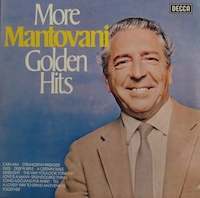
Very easy listening · Mantovani and his Orchestra — More Golden Hits. I have a bit of a soft spot for “easy listening” music from the period of my childhood, I think because my Dad liked to play it sometimes. Now I own several inches of such LPs, of which this is the best by miles. One generally doesn’t expect musical depth; in this case, one would be wrong. To start with, Mantovani gets a string sound — perhaps with the help of studio magic? — that is ravishing, just astonishingly sweet. Also, the arrangements are fine, the playing polished, and there are nice tunes here, especially Stranger in Paradise.
Date: 1976.

Hail Victoria · I mean Victoria de los Ángeles (1923-2005), Spanish soprano, and A World Of Song. I dropped the needle on this one and thought “pretty scratchy, probably not keeping it” but then Ms dlÁ started singing and I sat back and shut up. As I said, I rarely-to-never listen to recorded opera singers, but this is just an explosion of passion and power. I wish I’d found a way to see her perform in her lifetime. Wow.
Date: 1965.
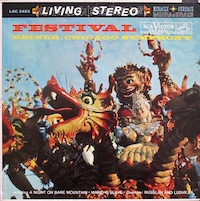
Russian Reiner · Marche Slave — A Festival of Russian Music. I don’t know the Russian for “chestnut" in the musical sense, but these are those. If you ever took a high-school music class and the teacher played you Famous Russian Tunes, you’ll probably find them here. They’re famous because they’re good. But let’s be honest, this one makes the list at least partly because it’s an audio showpiece. Turn it up as loud as you can without someone calling 911, and sink into the musical goo.
Date: 1960.
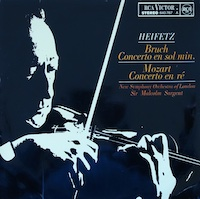
Bruch/Mozart violin · Heifetz — Bruch Concerto in G Minor — Mozart Concerto in D Major. Fine music, fine fiddler, fine orchestra, great sound; this is just a treat for the ears. The 19-year-old Mozart said his own debut performance of the D Major "went like oil" and I can see why, this is extremely smooth music.
Heifetz charges through the Bruch, high drama, maximum dynamics, thundering orchestra, soaring violin. What’s not to like?
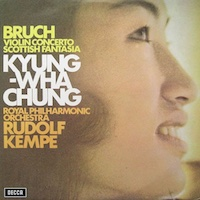
Wait, did I mention the B side of the record first? Yes, Heifetz’s assault on the Bruch is good fun. But the stack of inherited LPs also included Bruch / Kyung-Wha Chung Violin Concerto and Scottish Fantasia. She decided to maximize flow not drama and it’s really a much better take. Then on the Fantasia she and the orchestra reach back and let ’er rip, impossible to listen without smiling.
Date: 1963, 1972.
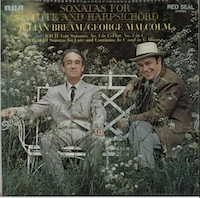
Julian & George · Julian Bream / George Malcolm – Sonatas For Lute And Harpsichord. The sonatas are by Bach and Vivaldi and they’re great. Also, I like that the cover photo of Bream and Malcolm looks like they’re just back from several hours at the pub. Here we have two instruments neither of which have any sustain, so achieving legato is a challenge, which the boys laugh at; the slow movements are the best part. They take liberties with the arrangements, with a sure hand I think. The shift between Johann Sebastian’s music and Antonio’s is unsubtle, and left me appreciating each of them more.
Date: 1969.
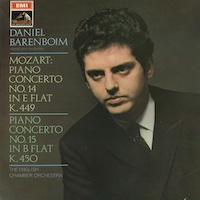
Tight Mozart · Daniel Barenboim, The English Chamber Orchestra - Mozart – Piano Concerto No. 14 In E-Flat, K. 449; Piano Concerto No. 15 In B-Flat, K. 450. It’s hard to go wrong with Barenboim and Mozart; also the orchestra is excellent and the recording just fine. But the thing that grabbed me here was the absolutely exceptional ensemble, as though the soloist and orchestra were sharinga single brain. Reminds me of a rock concert I stage-managed one time, the band had been on the road for a long time and, standing listening, one of my stagehands said to me "They, so tight, they loose.” Yeah.
Date: 1968.
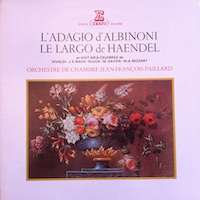
Serenity · No, not the spaceship in Firefly, the feeling. L'Adagio D'Albinioni / Le Largo De Haendel Et Huit Aria Célébres provides it. Along with Albinoni and Handel, there are tracks by Bach, Haydn, Gluck, and Mozart; every single one is a gem. Lots of modern-life situations demand serenity and it’s good to know there’s a flat round piece of vinyl that has it to offer.
Also, wonderful sound, but you probably won’t notice that.
Date: 1976.
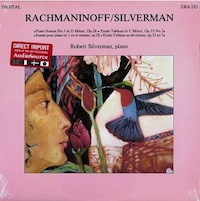
Take it down · Rachmaninoff / Silverman – Piano Sonata No. 1 In D Minor, Op. 28 / Etude-Tableau In C Minor, Op. 33 No. 3 Silverman is a Canadian piano player who brings a lot of feeling to what he plays and I’m a fan. This outing is moody and restrained; I’d describe the tone as “heavy” in a good way, as in fully laden. There’s no rushing and no theatrics, just a whole lot of very good playing that is entirely sure of where it’s going and makes you content to wait while it gets there.
Date: 1976.
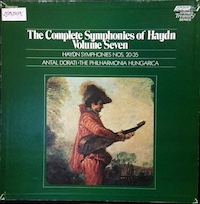
Symphony boxes · Haydn — Philharmonia Hungarica, Antal Dorati — Symphonies 20 - 35. Dorati put together an orchestra of Hungarians who got through the Iron Curtain after the 1956 upraising and they released all of Haydn’s hundred-plus symphonies, in multi-LP box sets. I inherited three such boxes, have only listened to a sampling of the sides, but have I ever enjoyed them. It’s mind-boggling that a mere mortal could create this much music at a very, very high standard. The production gets out of the way, the sound is decent, and the playing is unflashy but then so are the symphonies, mostly. Awfully good stuff.
Date: 1973.
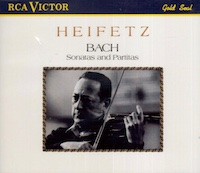
Violin alone · Heifetz Plays Bach — Unaccompanied Sonatas And Partitas (complete). For many years I’ve cherished Gidon Kremer’s recording of this material, blogging at length about it in 2007. Heifetz isn’t as precise and arguably doesn’t dig as deep into this very deep music. But it’s impossible not to enjoy because Heifitz sounds like he’s enjoying playing it so much. Kremer’s instrument vanishes for me, I just hear the music. Listening to Heifitz I think “That’s some damn fine fiddling.” The fact that it’s in mono is irrelevant for a recording of a single instrument, the sound is just fine.
Date: 1953.